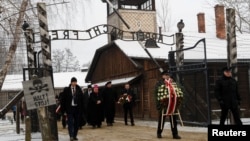Last Sunday, January 27, was the day designated by the United Nations as International Holocaust Remembrance Day. It was the 74th anniversary of the day Soviet troops liberated Auschwitz-Birkenau.
The camp run by the German Third Reich, located just over an hour from the Polish city of Krakow, was the largest of the network of concentration and extermination camps used to systematically murder Jews, homosexuals, political dissidents, Jehovah's Witnesses, Slavs, Roma, Poles, and the mentally and physically disabled.
Some 16 million civilians are believed to have died during the Nazi genocide we now call the Holocaust. Yet, as the event recedes into the past, studies show that today's generations are beginning to forget.
"We're losing that face-to-face connection," says Thomas Harding, who is spearheading an effort to create an education center in his family's former vacation home on the outskirts of Berlin. "One of the tasks that we have, I think, is to remind people what happened. The causes and results of prejudice, anti-Semitism, and xenophobia."
A 2018 study by the Conference on Jewish Material Claims Against Germany indicated two-thirds of American millennials could not identify what Auschwitz was. A Canadian study released this year said one in five young people in Canada either hadn't heard of the Holocaust or weren't sure what it was.
Meanwhile, anti-Semitic attacks in the United States rose 57 percent in 2017 over a year earlier, according to the U.S.-based Anti-Defamation League.
Harding, grandson of Jewish refugees from Germany who emigrated to Great Britain, is all too aware of what can happen when people forget how such tragedies happen. That's why Alexander Haus, named for his German ancestors, has invited students to the house, which is undergoing period-specific renovation, to talk about the past and consider ways to help people bridge their differences.
"I've been impressed by how they've been able to take those lessons from the past and apply them to today's world," Harding says. In addition the story of Jewish persecution in Germany, the house's story includes the hardships of World War II, of Russian occupation immediately after the end of the war, the divisions between East and West Germany, and the growing pains that accompanied reunification. Division and alienation played a role in the lives of each of the five families who lived in the house.
Hence, Harding's vision for the future of Alexander Haus includes building bridges — not just between Germans and Jews returning to Germany, but also between those who grew up on opposite sides of the Berlin Wall, and longtime German residents now faced with an influx of refugees from the Middle East and North Africa who are seeking new lives in Germany today.
As members of previous generations fade away, Harding says the house itself can help young people internalize the lessons of the past.
"We're very much using the lessons of the past in a very physical way," he says. "You have this small house with its fabric still there, which can tell the stories of the Holocaust but also the period of the Cold War. The Berlin Wall went between the house and the lake. The Berlin Airlift happened here. There are so many extraordinary stories."
"There is a very real anti-Semitism, Islamophobia, xenophobia in Germany, in Europe, in North America and in the world, and it's deeply troubling," Harding says. That makes the support his project has received feel all the more significant.
"It's provided this little space where people can come together and say no, we will not stand for that. . . . I think one of the lessons of history is that you need to call out when bad things happen. You can't just stand around and watch from the outside. And that's very much part of our work.
"We're in our early days," he says, noting that the renovation of the house, which was vacant for 10 years after reunification, is ongoing. French doors that open out to a view of the lake were recently installed. The historic fireplace at the heart of the home was recently restored. The home's shutters, bearing an iconic diamond design, are still being refurbished. There is still plenty to do. Yet, German villagers and other volunteers who are helping the Harding family have noted that support for the project is high, and many visitors leave the grounds determined not to let the future echo the past.
"So," Harding says. "Watch this space."
More about Alexander Haus today can be found at alexanderhaus.org. For more on its past, visit https://www.goethe.de/ins/us/en/kul/tec/tbp/hfr.html.




